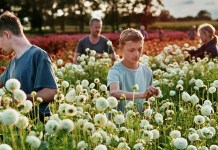“He had thrown himself into it with a creative passion, adding to it all the time, decking it out with every bright feather that drifted his way”.
So says Nick Carraway of the titular Gatsby in Baz Luhrmann’s dazzling if flimsy adaptation of the 1925 novel by F. Scott Fitzgerald. The quote also aptly applies to director Luhrmann to such a degree, the film is certainly excessively adorned with metaphorical bright feathers, that it almost seems obnoxious to make such an on-the-nose comparison. What is perhaps more surprising as one sits in the Debussy at the Cannes Film Festival, the location for the press screening of The Great Gatsby, is how this could also be used to describe those behind the Cannes Film Festival itself.
Beginning life in the thirties, roughly a decade after Fitzgerald’s novel was published, the Cannes Film Festival grew throughout the following decades and with the addition of the Marché du film, Cannes’ film market, in 1959 the festival began cementing itself as an important meeting place for art and commerce, the two central driving forces behind film itself. These two forces, which so often pull and push in different directions, but occasionally flow together, seem very apparent in The Great Gatsby, a film that, despite being the work of a highly talented group of people, feels in almost every way to be the work of a director with a singular vision.
The artistry which Luhrmann displays as a filmmaker, evident even though it is not always put to its best use, is at perhaps its most heightened in Gatsby, a film that is almost exhaustingly overstuffed in its early scenes. But Luhrmann’s particular brand of stylistic excess also seems very much of the moment. Despite sticking with the 1922 setting of the novel Luhrmann uses the most incongruous soundtrack choices possible, filling the film with loud blasts of Jay-Z, Lana Del Ray and Beyonce, amongst others. The effect is curious but not entirely unsuccessful. It will be intriguing to discover what teenagers and twenty-somethings, the so-called millennials, will think of this film, but if Luhrmann’s previous attempts to smash the ‘old world’ head-on into the modern world, Romeo and Juliet and Moulin Rouge for instance, are anything to go by it will most likely hit exactly as it is supposed to.
The clash of the old and the new is also something that is impossible to escape as one walks around Cannes, a beautiful and historic location for a festival but one swamped with technology as thousands of press and production companies descend on the city. In Cannes this struggle between the traditional and modernity moves beyond what appears on the screen in Gatsby too, with the premiere attended by over two thousand individuals, all dressed in tuxedos and evening gowns, all seated in the Grand Theatre Lumiere with one extra accessory, a rather large pair of red active 3D glasses.
As the camera sweeps through a digitally constructed New York City of 1922 or pans over the heads of revellers at one of Gatsby’s legendary parties, all captured in the rather broad 3D, one is struck by the degree to which all that we are seeing is both visually dazzling and also rather tacky. The bombardment of garish images that we see is rather in keeping with the tone of the first half of Luhrmann’s Gatsby but as the pace slows in the second half and things become more seriousness there is a difficulty in taking certain dramatic moments as anything but further absurd histrionics.
It’s another contrast in Gatsby shared with the Cannes Film Festival but another characteristic that more raises a smile than it does impress. If one stops for just a moment in Cannes and surveys the scene in front of them they are more than likely to see sights such as gentlemen in tuxedos awkwardly juxtaposed with a guy in a Toxic Avenger mask or a tacky seaside ice cream parlour nestled next to a estate agent selling multi-million Euro homes.
Cannes seems so much like the natural home for Luhrmann and his Great Gatsby, and even the character of Gatsby himself, that it may just be the most perfect opening choice in the festival’s history, even if it will no doubt be far from one of the best films shown here.











